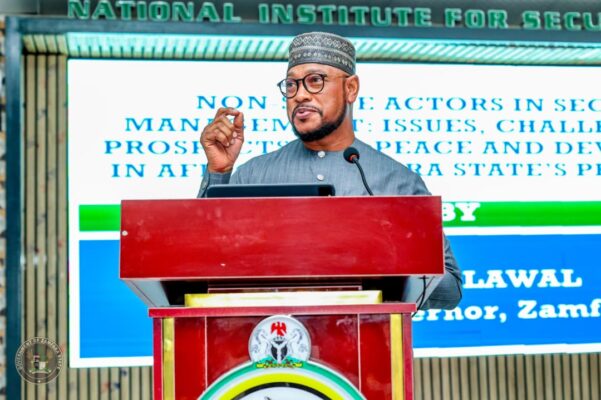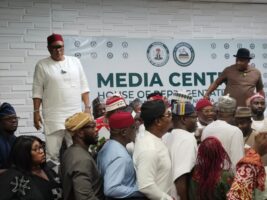Governor Dauda Lawal warned that negotiations allowing armed groups to keep their weapons while setting peace terms only delay violence and weaken State sovereignty.
The governor was a guest lecturer to participants of the Executive Intelligence Management Course (EIMC) 18 on Wednesday at the National Institute for Security Studies in Abuja.
A statement by the spokesperson for the governor, Sulaiman Bala Idris, disclosed that the theme of the lecture is “Non-state Actors in Security Management: Issues, Challenges, and Prospects for Peace and Development in Africa – A Zamfara State Perspective.”
The statement added that the EIMC 18 participants are from agencies vital to Nigeria’s security framework, along with their counterparts from other African nations, including Chad, Ghana, Rwanda, Somalia, and Gambia.
Governor Lawal, in his lecture, noted that it serves as an opportunity to reflect on the Zamfara experience, which, in many ways, parallels the broader local, national, and continental struggles for peace, stability, and development.
He said: “Over the past two decades, Africa’s security landscape has changed beyond traditional definitions. The idea that the state has exclusive control over the use of force is being increasingly challenged by a variety of non-state actors. These include community vigilantes, civil defense groups, insurgents, bandits, and transnational criminal networks.
“Zamfara State’s security challenges stem from years of grievances, economic issues, competition for resources, and climate change. Factors such as the spread of small arms due to regional conflicts, weakened traditional authority, inadequate law enforcement, and rising youth unemployment have exacerbated the situation.
“When we assumed office in 2023, it was made very clear that the security of life and property remains the essence of the modern state system and thus no price is too high to pay. Yet, effective security management cannot succeed without the active participation of the local community. Our strategy, therefore, has been anchored on
three mutually reinforcing pillars.
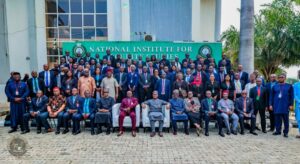
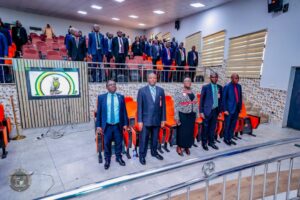
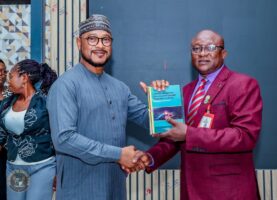
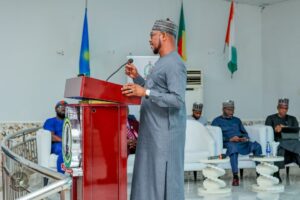
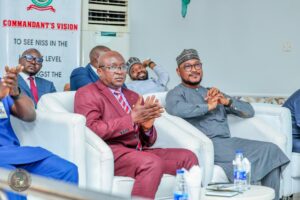
“We improved coordination among security agencies through a unified State Security Council led by me. The Zamfara State Government formed Community Protection Guards (CPG) to support law enforcement. We also enhanced intelligence sharing among traditional institutions, Local Government Councils, and security agencies for a coordinated response to threats.
“To foster durable peace, we formed peace committees in every Local Government Area, including Emirs, Imams, women, and youth leaders, to mediate conflicts and rebuild trust. We also collaborated with the Office of the National Security Adviser and international partners, such as Colombia, on Preventing and Countering Violent Extremism (PCVE), focusing on rehabilitation, reintegration, and trauma healing.”
The governor further stressed that Zamfara State strongly frowns at the ongoing, unregulated peace efforts being undertaken in parts of the North-West with violent non-State actors.
“Dialogue can aid conflict management, but true peace requires disarmament, and reconciliation without control equates to surrender. Allowing armed groups to keep their weapons while setting peace terms simply delays violence and compromises state sovereignty.
“At this crucial time, peace efforts should be strong, coordinated, state-led, and backed by legitimate authority. The State must show it has both the capacity and the will to enforce peace. Sustainable peace arises when armed actors acknowledge the rule of law and the Government’s commitment to protect its citizens.”
The Commandant of the National Institute for Security Studies, J.O. Odama, FSI+, FDC, said Governor Lawal has assigned the participants a task related to policing and provided guidance on the issue of cross-border.
He said: “Today, His Excellency has brought to us what the facts are, what the issues, challenges, and prospects are for a future Zamfara. For me, it was revising what I know about Zamfara. I grew up there, and my career has taken me back there. I know every inch of bitterness that was thrown at him when he was contesting for governor. It is now history; he has transformed the state from one of negativity to one of positivity.”

